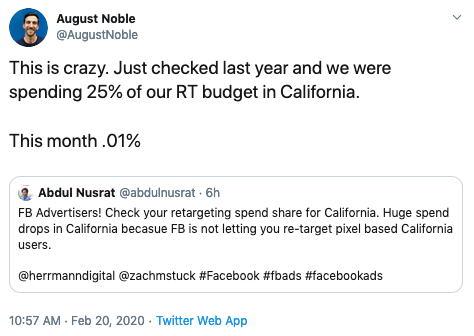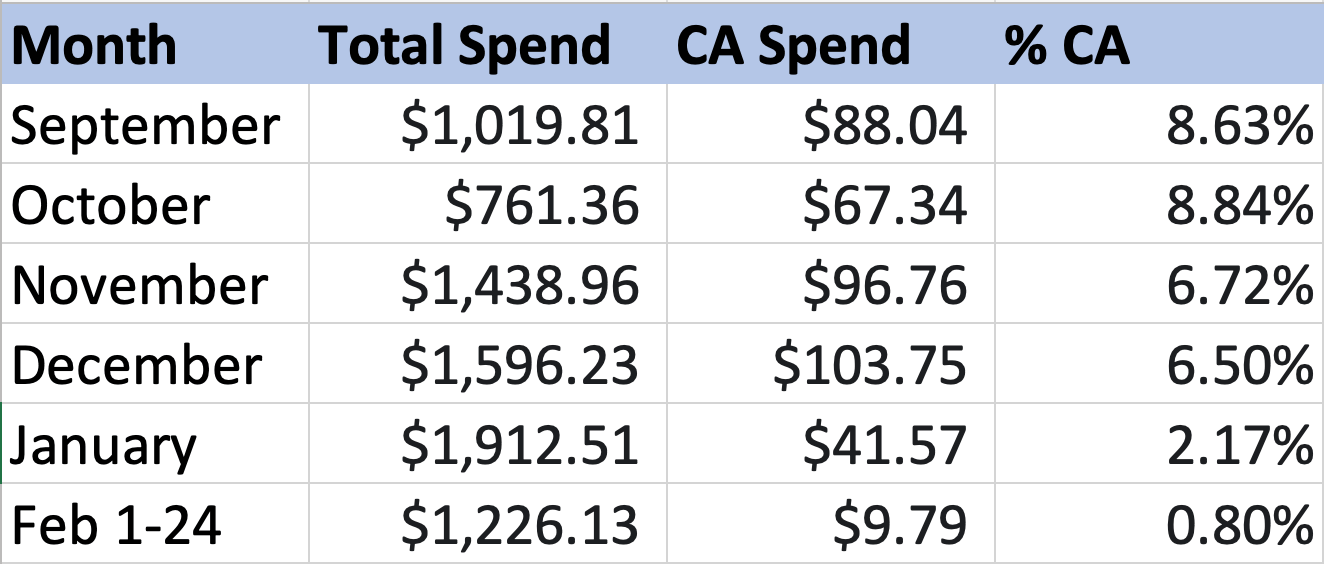February 28th, 2020
Have you noticed a sharp decline in spend for your Facebook remarketing campaigns targeting California users? If so, you’re not alone. Last week, Facebook ad strategists August Nobel and Abdul Nusrat both experienced significant drops in their retargeting spend share for California. Nobel reported he was seeing as much as 25% of retargeting budgets going to California last year — in February, less than 1% was being spent in California.

At AKvertise, we have also seen a major decline in pixel-based retargeting spend and conversions in California within each of our Facebook and Instagram client advertising accounts. When comparing remarketing campaigns from January and February, 2020 to campaigns that ran last year, there is a significant decrease in the amount of spend going to California.
Here are two retargeting campaign examples from both ends of the budget spectrum that show just how steep the drop has been in the last few months:
Client One: The percent of budget being spent in California dropped from 8.63% in September to 2.17% percent in January — and then fell below 1% in February.

Client Two: The trend followed suit even with a much larger total campaign spend, dropping from 13.42% in December to 3.33% only two months later in February.

Why is this happening? As Nusrat pointed out, Facebook most likely is not letting advertisers running Facebook or Instagram ads retargeting Pixel-based California users now that the California Consumer Privacy Act (CCPA) is in effect.
CCPA: A brief overview
For anyone unfamiliar with the California Consumer Privacy Act, it is a statute designed to protect the rights of California consumers that went into effect on January 1, 2020. The law is one of the first iterations of the GDPR (Europe’s General Data Protection Regulation) to be mandated in the U.S.
The CCPA grants the following rights to California consumers:
- The right to know what personal information is collected, used, shared or sold, both as to the categories and specific pieces of personal information.
- The right to delete personal information held by businesses and by extension, a business’s service provider.
- The right to opt-out of sale of personal information. Consumers are able to direct a business that sells personal information to stop selling that information. Children under the age of 16 must provide opt in consent, with a parent or guardian consenting for children under 13.
- The right to non-discrimination in terms of price or service when a consumer exercises a privacy right under CCPA.
According to the legislation, these consumer rights apply to businesses that meet the following criteria:
- Have a gross annual revenue in excess of $25 million.
- Buy, receive, or sell the personal information of 50,000 or more consumers, households, or devices.
- Derive 50% or more of their annual revenue from selling consumers’ personal information.
The law also stipulates businesses that handle the personal information of more than four million consumers will have additional obligations. (There are more details to the law which you can find on the State of California’s Department of Justice website.)
Facebook has been vague about how it will handle CCPA regulations from the start. In December of last year, Facebook published the following statement on its business blog:
“To comply with the CCPA, businesses will have to assess whether their data transfer activities constitute a “sale” of data under the law … We encourage advertisers and publishers that use our services to reach their own decisions on how to best comply with the law.”
Now that CCPA is in effect, it’s clear Facebook and Instagram ads are being impacted.
A workaround for retargeting campaigns with California audiences
We’re still in the early stages of CCPA and the long-term implications of how the legislation will impact Facebook campaigns are unknown. But the first month-out view definitely is concerning if you’re running campaigns aimed at users in California.
There is good news: we have been able to devise a remedy. In fact, we’ve already set-up and launched new campaigns and ad sets this week for each of our affected accounts to create a workaround for clients that rely on the ability to target California customers to meet conversion volume and revenue goals. Here’s how it works:
Since we cannot effectively use pixel-based Custom Audiences, such as website visitors, for remarketing in California any longer, we have set up new ad sets targeting California ONLY for users who have engaged with a post or ad on Facebook or Instagram in the last 180 days. We have found this is an efficient way to target users who have engaged with an ad and most likely clicked on the client ad and landed on the client’s website — thus being tagged by the pixel. While not all of these users may have clicked the ad, they did engage with it in some manner.
It has been less than a week since we’ve implemented this new tactic and we’re already seeing conversions with these newly created remarketing ad sets.
Is CCPA costing you revenue?
If you are experiencing a deep decline in the amount of your ad spend going to California and are losing revenue daily because you’re unable to target California users, we can help. AKvertise provides a broad array of consulting and account management services and can put our expertise to work for you to get your retargeting campaigns back on track.
Contact us now and we will set up a time to talk about your current Facebook goals and how your ads may be impacted by the new CCPA regulations.
Share: